Enlightenment Romanticism Contemporary Culture Research Unit
Faculty of Arts
The ERCC is an interdisciplinary research unit that asks big-picture questions about the present, its pasts, and our possible futures. We take as our leading question, ‘What does it mean to be human in the 21st century?’
About the research unit
Contemporary notions of reason, imagination, literature, Nature, sexuality, science, democracy, and even the Human were forged by Enlightenment and Romantic thought.
Yet this inheritance now seems threatened, paradoxically, by developments it has helped engineer and with which it is still entwined: the digital revolution, globalisation, climate change, fake news, and the emergence of artificial intelligence.
At the same time, the currents of European thought, which once seemed (at least to some) correspondent with the progress of history, now belong to a world where Europe is only one centre amongst many.
What is to be done?
Our vision and purpose
In this volatile environment, the ERCC conducts high quality, internationally relevant research into myriad aspects of the history and literature of European and non-European Enlightenments, Romanticisms and contemporary culture, to inform public discourse, strengthen civic engagement and contribute to a better world.
We interrogate dominant notions of Enlightenment and Romanticism, and their ambiguous historical legacies; work to bring European and non-European traditions into dialogue with each other; and create new understandings of person-formation, historical complexity and global plurality, while also exploring their implications for critical scholarship, public discourse, civic imagination, and education.
Working in partnership with scholars from across the disciplines, with industry, government, community groups, and learners of every age, we learn from each other to find common themes and approaches to the question of what it means to be human in the contemporary world.
How we work
The ERCC fosters research that is at once historically engaged and profoundly of the moment. It engages diverse disciplines and stakeholders in order to think differently about how to solve contemporary problems in new ways.
Our work proceeds from an awareness of place. Located in the Indo-Pacific region, Melbourne has been shaped by indigenous, settler, and migrant communities. As a site of local, national, regional, and global connectedness, it offers an unparalleled opportunity to address, from fresh perspectives, matters of local and global concern.
Our postgraduate program
The ERCC postgraduate program supports high-quality postgraduate and postdoctoral research experiences in areas relevant to the ERCC. We offer mentoring and research support schemes, career development initiatives, and networking opportunities. Graduate researchers affiliated with the ERCC have the chance to become part of a lively postgraduate community and an active part of the research unit through tailored postgraduate events and other research initiatives.
The ERCC aims to provide a supportive and collegial environment for students as they develop their individual research trajectories and progress from Honours to postgraduate to early career researcher level.
The ERCC acknowledges the Wurundjeri and Boonwurrung Peoples of the Kulin Nation as the traditional owners of the unceded land on which the University stands, and pays respect to the Elders past, present and emerging.
Banner image credit: Es Devlin, Memory Palace (detail), 2019, courtesy of the artist.
Summary
The contrast between Enlightenment and Romanticism is commonly used to define the beginning and end, respectively, of the cultural shift that takes us from traditional to modern cultural forms. Our themes flag the complexity of this shift; the ways in which it was influenced, adopted, or challenged by non-European cultures; and its legacies in the present.
But our themes are also a manifesto, announcing that this field is shaped by historical forces entangled with each other. Our mode of working is therefore necessarily collaborative, interdisciplinary, and methodologically innovative.
- Each theme identifies a line of force linking Enlightenment/Romanticism with its legacies in the present. Clicking on the images takes you to a summary of the relevant theme, which appears alongside a list of related projects on which members of the ERCC are working. An alphabetical list of projects can be found under Projects.
- Seen as a whole, these themes represent a culturally diverse, interdisciplinary community of scholars, artists, galleries, and community groups in conversation with each other—a conversation we believe is crucial if we are to understand and so redirect the lines of force shaping the present, its pasts, and our futures.
- Just as importantly the lines of force traced by our themes, along with the community they have gathered and conversations they continue to provoke, provide the wide platform and broad expertise necessary to address our guiding question, namely ‘What does it mean to be human in the 21st century?’
-
Critique, Creativity, Comparison
-
Worldliness, Cosmopolitanism, Globalisation
-
Liberty, Colonisation, Slavery
-
Actual, Mixed and Virtual Realities
-
The Human, the Nonhuman and the Inhuman
-
Non-European Enlightenments and Romanticisms
-
Dark-, Counter-, and Anti-Enlightenments
-
The Anthropocene
-
The Democratic Imaginary
Here you will find a list of research projects associated with the themes of the Enlightenment, Romanticism, and Contemporary Culture Research Unit.
-
Architectures of Imagination: Bodies, Buildings, Fictions, and Worlds
-
Azuchi Screens Research Network
-
Beyond Identity: Romanticism and Decreation
-
British Romanticism and colonial modernity in India, 1780-1840
-
Climate Science Denialism and its populist Analogs
-
Critique, Creativity, Innovation
-
Extremism and the Australian Imaginary
-
Gothic Fictions: Emotion, Contagion, and the Transformation of Experience in Modernity
-
Human Kind: transforming identity in Australian and British portraits 1700-1900
-
Islam and the Left in Indonesia and Turkey
-
Kenzaburo Ōe and William Blake: Modernity, Romanticism, Japan
-
Literary Romanticism and the Media of Romantic Love
-
Natural Born Subjects: A Cultural History of Naturalization in Britain and the Australian Colonies, 1660-1850
-
New tastemakers and Australia’s post-digital literary culture
-
Observation and Analogy in Enlightenment and Romantic Natural History
-
Reconstructing museum specimen data through the pathways of global commerce
-
Regency Flash: Britain, Ireland and Australia, 1788-1848
-
Romantic Worlding
-
The Butterfly Men of Kuranda: natural history dealers in the 'deep north'
-
The George Lyell Collection
-
The Past and Present of Sugar
-
The Pasts and Futures of Virtual Reality
-
Theorising the online anti-public sphere
-
War-Widow, Mother, Slave, Refugee: Andromache in Romantic Europe
-
William Blake and the History of Imagination: Poetry, Prophecy, and Secularization
-
World Literatures, Theatres and Cultures research network
Directors and Lead researchers
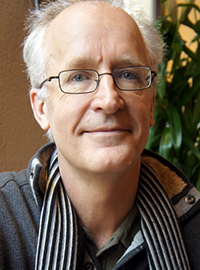
Professor Peter Otto
Executive Director, Enlightenment, Romanticism, and Contemporary Culture Research Unit (ERCC); Redmond Barry Distinguished Professor, English and Theatre Studies, the University of Melbourne
Peter Otto has published widely on William Blake, Gothic Fictions, dark Romanticism, popular entertainments, the prehistory of virtual reality, and Romanticism and contemporary culture. Recent publications include Multiplying Worlds: Romanticism, Modernity, and the Emergence of Virtual Reality (OUP 2011); ‘Innovations in Encompassing Large Scenes’, an online exhibition housed in the Romantic Circles Gallery of Visual Culture (2013); and William Blake: Selected Works in the ‘21st Century Oxford Authors Series’ (2018). He is consultant editor of The Victorian Popular Culture Portal: Spiritualism, Sensation, and Magic. His current research interests include the history of imagination and of imagination-machines; the pasts and futures of virtual reality; the post-secular; and the exchanges between architecture, fiction, imagination, and experience.
Email: peterjo@unimelb.edu.au
Phone: +61 3 8344 5482
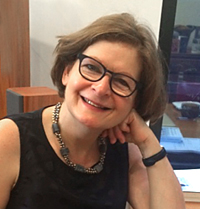
Professor Deirdre Coleman
Co-Director and Lead Researcher, ERCC; Robert Wallace Chair of English, English and Theatre Studies, School of Culture and Communication, the University of Melbourne
Deirdre Coleman has published widely on the intersection of British Romantic literature with antislavery, natural history and colonialism. More recently she has been researching museum archives in Melbourne, Sydney and Queensland for an ARC-funded Linkage project with the Australian Museum on the economics of the 19th-century natural history trade. She is also exploring the social history of collecting in Australia, looking in particular at the diverse community which produced knowledge about the natural world from earliest settlement onwards. Starting with the correspondence networks and journal publications of members of the Victorian Field Naturalists Club (established in the early 1880s), she examines the motives and interests of bushmen, commercial specimen dealers, amateur collectors and (from 1900 onwards) an increasing number of salaried museum professionals. Cross-cultural exchange between indigenous people and fieldwork collectors on the colonial frontier, especially in far north Queensland and the Northern Territory, forms another part of this project, the aim of which is to achieve a wider understanding of Australia’s natural heritage and environmental history.
Email: colemand@unimelb.edu.au
Phone: +61 3 8344 5496
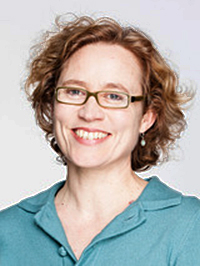
Professor Clara Tuite
Co-Director and Lead Researcher, ERCC; English and Theatre Studies, School of Culture and Communication, the University of Melbourne
Clara Tuite works in the literary and cultural history of Romanticism, with a particular interest in the work of Jane Austen and Lord Byron. Her research engages eighteenth- and nineteenth-century Romantic literature and culture from the perspectives of the history of the literary institution, sociability, fashion, history of emotions and sexuality studies, as well as the endurance of literary and popular Romanticisms in the contemporary moment.
Email: clarat@unimelb.edu.au
Phone: +61 3 8344 4216

Professor Mark Davis
Co-Director and Lead Researcher, ERCC; Publishing and Communications, School of Culture and Communication, the University of Melbourne
Mark Davis’ current research focuses on online ‘anti-publics’ and extreme online discourse, Australian digital literary cultures and taste making, changing media ecologies and the cultural politics of gatekeeping and disintermediation, Australian public culture, and media representations of young people. The first of my two current research projects focuses on post-digital literary cultures and the destabilisation of the literary-print cultural field by digital media. My second project focuses on online anti-publics, such as the alt-right, neo-reactionary (NRx) groups, anti-vaccination groups, anti-climate-science groups, and white nationalist groups, who use digital media to create communities that position themselves against basic democratic, scientific, and enlightenment principles.
Email: davismr@unimelb.edu.au
Phone: +61 3 8344 3349
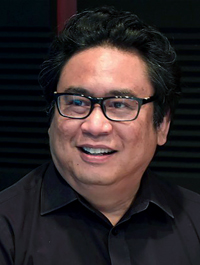
Professor Vedi Hadiz
Co-Director and Lead Researcher, ERCC; Director and Professor of Asian Studies at the Asia Institute, the University of Melbourne
Vedi Hadiz's research interests revolve around political sociology and political economy issues, especially those related to the contradictions of development in Indonesia and Southeast Asia more broadly, and more recently, in the Middle East. Professor Hadiz’s latest book is entitled Islamic Populism in Indonesia and the Middle East (Cambridge University Press 2016). His other books include Localising Power in Post-Authoritarian Indonesia: A Southeast Asia Perspective (Stanford University Press 2010) as well as the co-edited Between Dissent and Power: The Transformation of Islamic Politics in the Middle East and Asia (Palgrave Macmillan 2014).
Email: vedi.hadiz@unimelb.edu.au
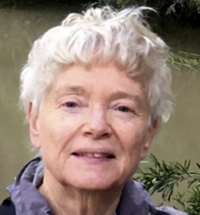
Professor Anne McLaren
Lead Researcher, Enlightenment, Romanticism, and Contemporary Culture Research Unit (ERCC)
Anne McLaren is a Professorial Fellow at the Asia Institute University of Melbourne.
Trained as a sinologist at the Australian National University, she is internationally known for her research into the relationship between Chinese oral performance traditions and print culture in the late imperial era. She has also published on Chinese Intangible Cultural Heritage and served as Research Fellow at the Center for Intangible Cultural Heritage at East China Normal University, Shanghai. She is the author or editor of eight books and numerous other studies on a range of topics relating to the cultural history and literature of China in the early modern period. In 2010 she was elected a Fellow of the Australian Academy of Humanities for her pioneering work on the oral and ritual culture of Chinese women.
Her latest book, Slow Train to Democracy: Memoirs of Life in Shanghai, 1978 to 1979 (2020), offers insight into China’s democracy movement at the start of the reform era. Her books include Performing Grief: Bridal Laments in Rural China (2008), Chinese Women Living and Working (2004), Dress, Sex and Text in Chinese Culture (co-edited with Antonia Finnane, 1999) and Chinese Popular Culture and Ming Chantefables (1998).
Email: a.mclaren@unimelb.edu.au

Dr Marc Mierowsky
Co-Director and Researcher, McKenzie Postdoctoral Fellow, School of Culture and Communication, the University of Melbourne
Marc Mierowsky’s research ranges broadly across period and genre, but is unified by the drive to investigate questions of collective identity and uncover the cultural dimensions of citizenship. He is one of the editors of Daniel Defoe’s Correspondence (along with Nicholas Seager and Andreas Mueller) forthcoming with Cambridge University Press, and editor (along with Nicholas Seager) of Defoe’s Roxana, forthcoming with Oxford World’s Classics. His interest in Enlightenment thought and literature coheres around questions of sovereignty, naturalisation and constitutionality, the emergence of common-sense philosophy and theories of intersubjectivity. He is currently working on two discrete but overlapping projects: a narrative history of the group of spies whose work helped bring Scotland into an incorporated Union with England in 1707 and a cultural history of naturalisation in Britain and the Australian colonies. In recent work he has focused on the enlightenments of Eastern Europe, with particular emphasis on the Haskalah (or Jewish Enlightenment) and its influence on contemporary literature, ethics and stand-up comedy.
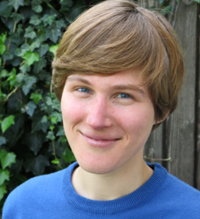
Dr Miranda Stanyon
Co-Director and Researcher, ARC DECRA Research Fellow, School of Culture and Communication, the University of Melbourne
Miranda Stanyon’s research focuses on enlightenment and Romantic era literature in Britain and Germany and takes a comparative approach to aesthetics, as a key field in constructing the post-enlightenment human subject and configuring its relationships with nature. She has published on the sublime, music and sound, emotions history, and visual culture.
Email: stanyonm@unimelb.edu.au
Associate researchers

Dr Anita Archer
Postdoctoral Research Fellow, Enlightenment, Romanticism, and Contemporary Culture Research Unit, Faculty of Arts, the University of Melbourne
Anita Archer is an art historian whose research focus is contemporary art markets, with interest in the changing dynamics of primary and secondary markets, the evolving domination of multinational auction houses and the networked activities of art world intermediaries in the translocation of art globally. Anita’s PhD thesis examined the emerging market for Chinese Contemporary Art in the West and her recent focus is the role of Singapore as an art market hub for Southeast Asia. Anita’s research interest stems from her extensive work experience in the global art field as an international auctioneer and independent art consultant specialising in Asian contemporary art.
Email: anita.archer@unimelb.edu.au

Associate Professor Justin Clemens
Academic, School of Culture and Communication, the University of Melbourne
Justin Clemen’s work focuses primarily on the relationships between poetry, psychology and philosophy in Romantic and post-Romantic writing. He has written extensively on figures such as Sigmund Freud, Jacques Lacan, and Alain Badiou, as well as on themes of slavery and technology. His recent books include What is Education? (Edinburgh UP 2017), edited with A.J. Bartlett and The Afterlives of Georges Perec (Edinburgh UP 2017), edited with Rowan Wilken.
Email: jclemens@unimelb.edu.au
Photo credit: Nicholas Walton-Healey
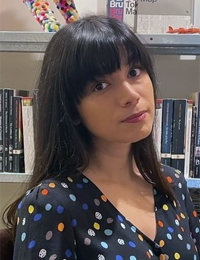
Dr Sara Crouch
Sara Crouch’s research interests include skin studies, medical history, and disability studies, with a focus on the way these disciplines intersect to generate new ways of thinking about the eighteenth-century novel in English. She has a particular interest in the writings of Frances Burney, John Cleland, Maria Edgeworth, and Tobias Smollett. Her doctoral thesis examined the ways in which medical discourse and scientific understanding and misunderstanding shaped attitudes towards human skin during the long eighteenth century in England, and how these in turn encoded the representation of character and the development of form and genre. She has published on the representation of sex work, maritime borders, and the stigmatised sexual touch in Medical History (2019) and on Burney’s representation of scarring and disability in Textual Practice (2020).
Email: sarafernandes.crouch@unimelb.edu.au
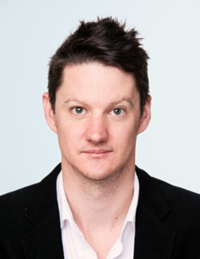
Dr Thomas H. Ford
Lecturer in English, School of Humanities and Social Sciences, La Trobe University
Thomas Ford’s work focuses on poems and other texts from Romanticism and the long eighteenth century. He reads this archive in the historicist traditions of philological materialism, and in light of the transdisciplinary imperatives of the environmental humanities. Ford calls this approach ‘ecophilology’ (a discipline that explores the role of textual environments in various settings, in all kinds of media, from the ancient cave drawings and graffiti to the contemporary electronic media). You can read about it in his book, Wordsworth and the Poetics of Air (Cambridge University Press, April 2018).
Email: T.Ford@latrobe.edu.au

Dr Sean Gaston
Visiting Scholar, Wolfson College Oxford (2017-2018), Emeritus Reader in English, Brunel University, London, and Honorary Research Fellow, the University of Melbourne
I am exploring ‘the eighteenth century origins of modernity’. I have focused on concepts of disinterest, sympathy and pity, as well as fictions of imprudence and the invention of the literary character. I am now working on concepts of world in British Romanticism, Revolutionary America and the ‘Atlantic World’.
Email: gastons@unimelb.edu.au
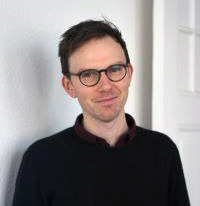
Dr Ben Gook
Lecturer in Cultural Studies, School of Culture and Communication, the University of Melbourne
Ben Gook’s current research focuses on alienation and disaffection in contemporary culture (post-1989). He has written on emotions and affects (melancholy, ecstasy and ambivalence), Germany (social, cultural, economic and psychic history) and Australia (postcolonial cinema). His book Divided Subjects, Invisible Borders: Re-unified Germany after 1989 (Rowman & Littlefield International, 2015) is a psychoanalytically informed study of the complicated process of re-unifying Germany after the Fall of the Berlin Wall. He has forthcoming publications on collectivity, transindividuality, libidinal economy and alienation.
Email: benjamin.gook@unimelb.edu.au
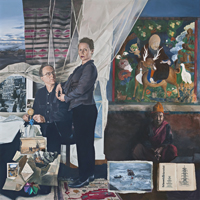
Professor Charles Green
Professor of Contemporary Art, School of Culture and Communication, the University of Melbourne
Charles Green is an authority in contemporary international and Australian art, on biennials and exhibition histories, and on artist collaborations. His books include Biennials, Triennials and Documenta: The Exhibitions that Created Contemporary Art (2016, co-authored with Anthony Gardner), The Third Hand: Artist Collaborations from Conceptualism to Postmodernism (2001), and Peripheral Vision: Contemporary Australian Art 1970-94 (1995). He has been awarded several ARC grants and was Adjunct Senior Curator of Contemporary Art at the National Gallery of Victoria (2001-2006), leading large curatorial teams who produced major exhibitions, including the inaugural, museum-wide installation of modern and contemporary Australian art at NGVA Federation Square (Fieldwork, 2001) as an outcome of an ARC Large Grant. He is also an artist, having worked in collaboration with Lyndell Brown as one artist since 1989; their works are in most Australian art museum collections and they were Australia’s Official War Artists in Iraq and Afghanistan in 2007.
Email: c.green@unimelb.edu.au
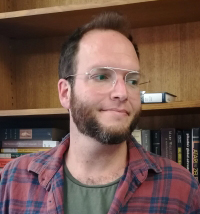
Dr Elias Greig
Elias Greig’s work considers the interaction between artistic and political representation, with a particular interest in the effects of democracy on literary form, from the eighteenth century to the present.
Email: elias.greig@unimelb.edu.au
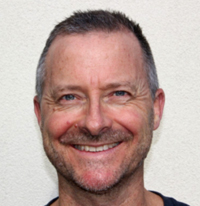
Dr Steven Hampton
Monash University
Steven Hampton continues to inhabit two distinctly separate worlds: firstly, research into the multilingual and transnational nature of cultural and literary production during the eighteenth and nineteenth centuries in Europe, in particular the interrelations between literatures in English, French and German, with a focus on the national epic as it was reconstructed, rediscovered or invented during the Age of Revolutions. Secondly, the hands-on design and construction of complex computer software systems for educational institutions in the present day, including the use of artificial intelligence. Both of these worlds require the application of critique, creativity and comparison but find their deepest synergies in the invention, discovery and construction of "actual, mixed and virtual realities".
Email: steven@stevenhampton.com
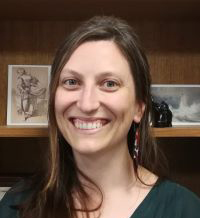
Dr Alexandra Hankinson
Alexandra Hankinson’s research focuses on the literary and cultural history of biological thought and phenomena from the Enlightenment to the present. Her doctoral thesis explored the cross-section between figurative and scientific thought in the botany and zoology of the long eighteenth century, with emphasis given to the way in which observation and analogy came together in this period to uncover and explain the affinities of living objects. She has published on the poetic and scientific history of insect pollination in Romanticism (2019) and is currently working on an online exhibition for the Romantic Circles Gallery of Visual Culture on hybrid and interspecific relationships. Her present research interests include the co-functioning of art and science in the discovery and description of camouflage and mimicry; histories of biodiversity and ecology in Australia; field notes; imaginative and scientific responses to avian migration; and seasonality and harvest in Romantic art and literature.
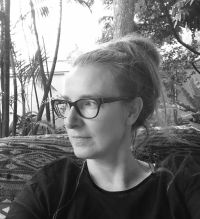
Dr Jodi Heap
School of Culture and Communication, the University of Melbourne
Jodie’s research focuses on Western philosophical conceptions of the imagination and the imaginary from Aristotle to Castoriadis. Her PhD thesis, titled The Imagination. The Seed of Indeterminacy in the Writings of Kant, Fichte and Castoriadis, offered a scholarly elucidation of the notion of the imagination and the imaginary as well as provided a new way of thinking about the imagination as an embodied power of formation and of creation fundamental to both the ontology of being and of ways of being. Her area of research also explores the role of the imagination and the imaginary in relation to the concepts of creation and creativity, and in relation to creative forms of thinking and of practice, both at the level of the individual and society. Jodie has a particular interest in the ERCC project ‘Creativity, Critique, Innovation’ and has contributed to the ERCC seminar series in her seminar titled, Unleashing the Creative Imagination in the Domains of the Humanities, Science and Art.
Email: jodie.heap@unimelb.edu.au

Dr James Jiang
School of Culture and Communication, the University of Melbourne
James Jiang’s research traces the residues of Romantic thought in modern and contemporary British and American writing. His recent articles on William James and Marianne Moore draw out the implications for literary modernism and philosophical pragmatism of concepts such as style and character – concepts which assume their modern shape in the late eighteenth and early nineteenth century. James is currently at work on a project entitled Sage Modernism that explores the intersection between pragmatist poetics and therapeutic culture.
Email: james.jiang@unimelb.edu.au
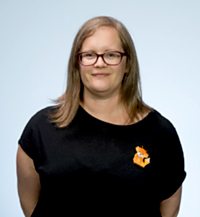
Dr Claire Knowles
Senior Lecturer in English Literature, La Trobe University, Melbourne
Claire Knowles has published numerous articles on eighteenth- and nineteenth-century women writers. Her book, Sensibility and Female Poetic Tradition, 1780-1860: The Legacy of Charlotte Smith, was published by Ashgate in 2009 and she also recently edited, with Ingrid Horrocks, Charlotte Smith: Major Poetic Works (Broadview, 2017.) She is currently working on a project on newspaper poetry and popular literary culture in the Romantic period titled, "Romanticism, Newspapers, and the Democratization of Poetry, 1785-1810."
Email: c.knowles@latrobe.edu.au
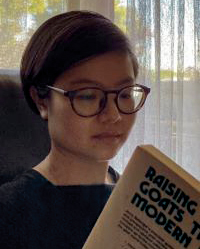
Dr Scarlet Luk
Scarlet Luk’s work toggles between two somewhat distinct lines of inquiry: the intersection between narrative and queer/trans theory, and more recently, the relationship between financialisation and critical race and migration studies in the transpacific. She hopes to one day reconcile the two. Since completing her PhD at Yale, Scarlet has been daylighting as a high school English teacher.
Email: luk.scarlet@gmail.com
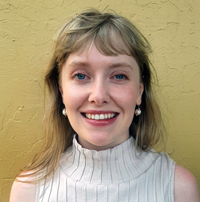
Dr Elizabeth McLean
School of Culture and Communication, the University of Melbourne
Elizabeth McLean’s research ranges from the Romantic period through to the contemporary, with a strong focus on processes of fictionality and genres of storytelling. She received her PhD in 2019 for her thesis, “The Topographical Parenthesis: Articulations of Space in the Novels of Henry James.” She is currently working on a trans-historical account of women’s literary journalism from the Enlightenment through to the present. This study is structured by four discrete episodes, that each present a composite of ideological and technological transformations vital to the professionalisation of literariness, journalism, and female authorship. These periods are: 1780s; 1890s; 1970s; Now. In a period of precarity for practitioners of both journalism and literary studies, this study looks to the late eighteenth century, and specifically to reportage of the French revolution, for a pre-history of the interdisciplinary form of literary journalism. In its veneration of both truth and form, literary journalism embodies the dualism of critique and creativity so essential to the relationship between Enlightenment and Romantic ideologies.
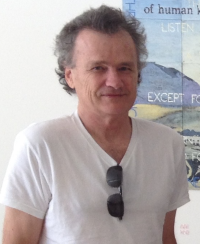
Professor Ian McLean
Hugh Ramsay Chair of Australian Art History, the University of Melbourne
Ian McLean has published extensively on Australian art and particularly Indigenous art. Since the late eighteenth century the Australian colonies have been a privileged site of Enlightenment endeavours in science, art and literature – as Bernard Smith convincingly discussed in European Vision and the South Pacific (1960). As a student of Smith, Ian’s research has consistently explored the shadow of the Enlightenment in Australia and its histories.
Email: i.mclean@unimelb.edu.au

Dr Matthew Martin
Lecturer in Art History and Curatorship, School of Culture and Communication, the University of Melbourne
Matthew Martin is an art historian and curator whose current research interests focus on the cultural aesthetics of porcelain in eighteenth-century Europe. He is particularly interested in the intersections between art history and the history of the chemical and geological sciences reflected in artworks produced by eighteenth-century European court porcelain manufactories.
Email: mmartin1@unimelb.edu.au
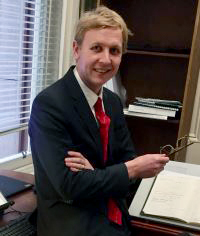
Dr David Mence
Honorary Associate, School of Culture and Communication, the University of Melbourne
David Mence is passionate about the political thought of the Enlightenment. He has a particular interest in social contract theory (as variously formulated by Hobbes, Locke and Rousseau) and notions of Atlantic Republicanism. He is currently working on a book for Oxford University Press on the Federalist politics of Herman Melville (Enlightenment at Sea: Melville’s Maritime Politics). He completed his doctoral thesis at the University of Melbourne under the supervision of Professor Peter Otto.
Email: dmence@unimelb.edu.au
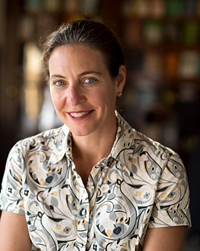
Professor Jennifer Milam
Research Associate, Enlightenment, Romanticism, and Contemporary Culture Research Unit, Faculty of Arts, the University of Melbourne; Pro Vice-Chancellor Academic Excellence, the University of Newcastle, Australia
Jennifer Milam’s research interests focus on understanding how the visual arts during the eighteenth century expressed philosophical ideas that rivalled the exposition of Enlightenment concepts in texts. Arguably what changed from the mid-eighteenth century onwards was broader exposure to ‘big ideas’ in visual form. Enlightenment ideas enjoyed wider circulation and cultural uptake through public exhibitions of art works that engaged audiences in interpretive response to aspects of the Enlightenment project. As a former Co-Director of the Enlightenment, Romanticism, and Contemporary Culture Research Unit (ERCC), Milam used her expertise in exactly this area to provide input into the research program of the ERCC by keeping this aspect of the Enlightenment in focus and elaborating upon its legacy in the contemporary culture sector.
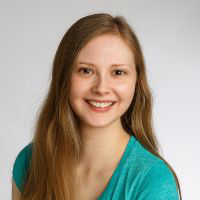
Dr Sonja Molnar
Lecturer in Media and Communications, the University of Melbourne
Sonja Molnar received her PhD in English Applied Linguistics from the University of Salzburg, where she taught courses on media discourse for six years. Thereafter she was a postdoctoral research assistant at the Vienna University of Economics and Business. Her main research areas include advertising discourse, sustainability communications, multimodality, and media linguistics. Her doctoral dissertation, which explores the verbal and visual changes in British, American and Australian print advertisements from the late seventeenth century to the present, will be published as part of the series Routledge Studies in Multimodality in 2021. Her current research project examines how environmental news is communicated in the mainstream media.
Email: sonja.molnar@unimelb.edu.au
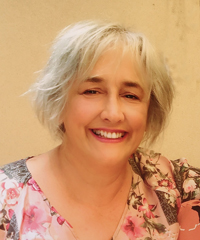
Professor Angela Ndalianis
Director, Centre for Transformative Media Technologies, Swinburne University of Technology
Angela Ndalianis is a Research Professor of Media and Entertainment, and Director of the Centre for Transformative Media Technologies at Swinburne University of Technology. Her research takes an interdisciplinary approach to entertainment media technologies, their histories and how they mediate our experience of the world – on embodiment, the senses and perception. Her publications include Neo-Baroque Aesthetics and Contemporary Entertainment (2004), Science Fiction Experiences (2010), The Horror Sensorium: Media and the Senses (2012); and the edited books – The Contemporary Comic Book Superhero (2009); Neo-baroques: From Latin America to the Hollywood Blockbuster (co-edited, 2016); Fans and Videogames: Histories, Fandom, Archives (co-edited, 2017), and The Superhero Symbol (co-edited, 2019).
Email: andalianis@swin.edu.au
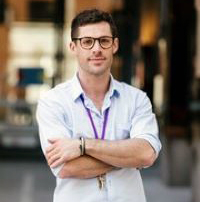
Dr Philip Pond
Lecturer in Digital Media Research Methods, the University of Melbourne
Philip Pond specialises in the study of software systems and their influence on the production of meaning, especially in politics. He is lead investigator on a Special Research Initiative investigating the relationship between between digital media and tendency for conversations to become extreme quickly and, more broadly, he investigates the relationship between digital speed and destabilising communication. He is author of two books. Digital Media and Making of Network Temporality (2021) explains how time can be reconfigured in digital systems with disruptive consequences. Complexity, Digital Media and Post-Truth Politics (2020) proposes a framework for studying destabilising interactions between the digital and political systems.
Email: ppond@unimelb.edu.au
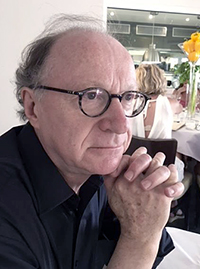
Associate Professor John Rundell
Principal Fellow, School of Culture and Communication, the University of Melbourne and Adjunct Professor in Philosophy, La Trobe University, Melbourne
John Rundell’s research focuses on the problems of the imagination, creativity and modernity. As ERCC Research Fellow he is especially interested in the themes of ‘Critique, Creativity, Comparison’ and ‘Worldiness, Cosmopolitanism, Globalisation’. His publications include Origins of Modernity; Imaginaries of Modernity; Aesthetics and Modernity Essays by Agnes Heller; Rethinking Imagination (with Gillian Robinson); Blurred Boundaries(with Rainer Bauboeck), and ‘Creating Social Theory: Enlightenment, Romanticism, Revolution’ in The Handbook for Social Theory edited by George Ritzer and Barry Smart. He is currently completing a book on the work of Immanuel Kant entitled Kant and Critical Theories before turning to another entitled The Creative Imagination: From Kant to Castoriadis and Beyond.
Email: johnfr@unimelb.edu.au
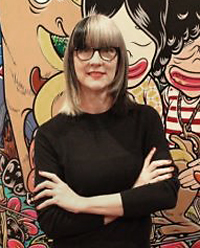
Dr Sarah Tiffin
Sarah Tiffin’s research focusses on depictions and descriptions of Southeast Asia in British art and creative literature of the seventeenth to nineteenth centuries. Formerly a Curator of Asian Art at the Queensland Art Gallery | Gallery of Modern Art, Sarah is the author of Southeast Asia in Ruins: Art and Empire in the Early 19th Century (2016) which explores how British picturesque imagery of ruined candi, pagodas and wats contributed to the networks of knowledge critical to imperial enterprise. She continues to publish on British ideas about ruins and ruination, and is also currently working on a study of the upas or poison tree of Java and its appearance in British art and literature over the long 19th century.
Email: sarahtiffin@bigpond.com
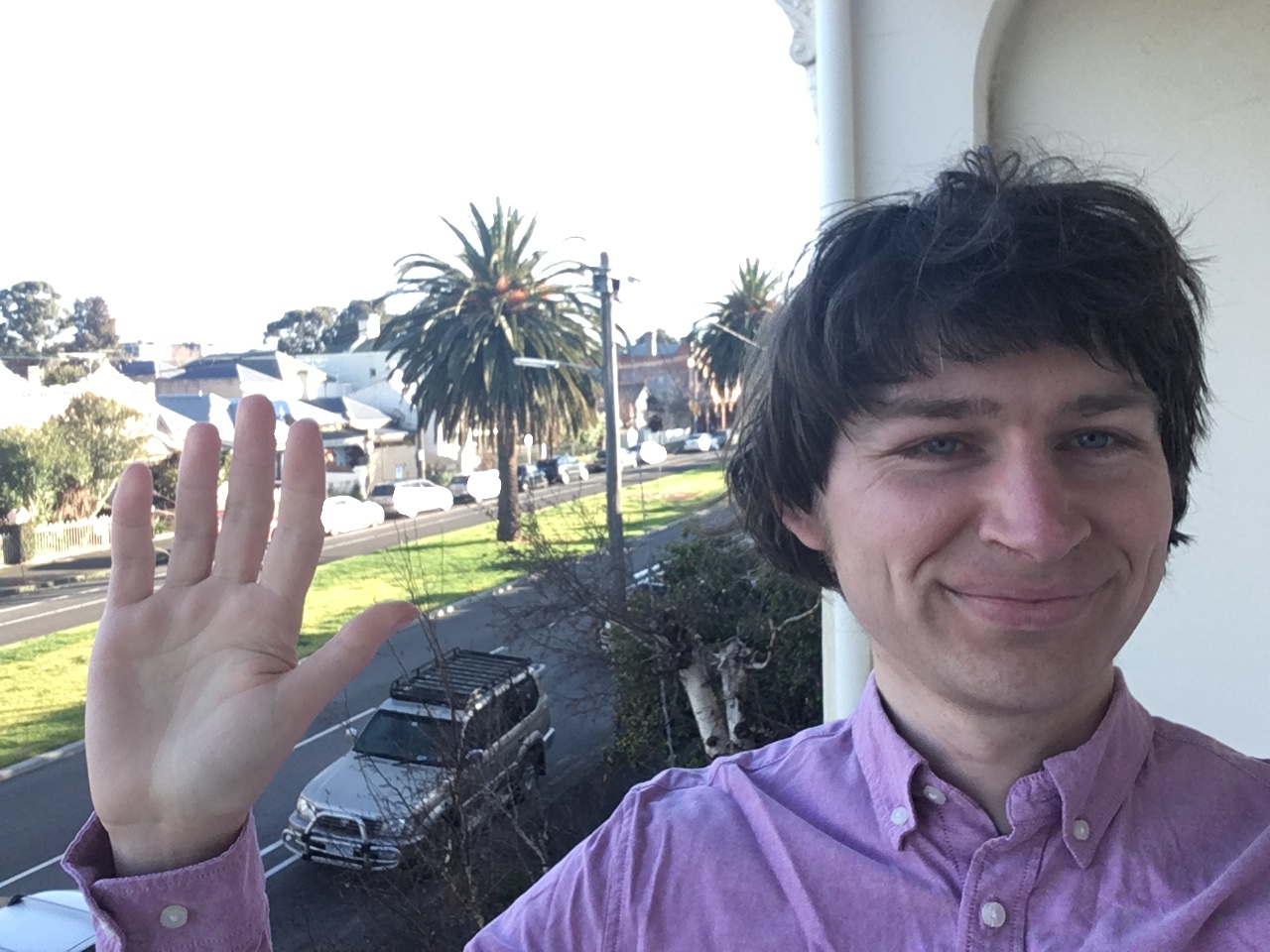
Dr Thomas Vranken
School of Pacific Arts, Communication and Education, University of the South Pacific
Thomas Vranken is Lecturer in Literary Studies at the University of the South Pacific (Laucala Campus, Suva, Fiji). With Suzy Anger, he is currently editing Victorian Automata: Mechanism and Agency in the Nineteenth Century (Cambridge University Press, 2023). He is the author of Simulating Antiquity in Boys’ Adventure Fiction: Maps and Ink Stains (Cambridge University Press, 2022), and Literary Experiments in Magazine Publishing: Beyond Serialisation (Routledge, 2020). Between 2019 and 2021, he was a Killam Postdoctoral Research Fellow at the University of British Columbia. He completed his PhD at the University of Melbourne in 2017.
Email: thomas.vranken@usp.ac.fj

Jennifer Wawrzinek
Dr Phil Habil Jennifer Wawrzinek
Freie Universität Berlin
Jennifer Wawrzinek’s research focuses on the intersections between the political and the ethical in literature and culture of the Romantic and post-Romantic eras. She recently completed a monograph entitled Beyond Identity: Romanticism and Decreation, which investigates modes of decreation in British Romanticism as a response to the political and ethical crises of the late-eighteenth and early-nineteenth centuries. Jennifer recently edited, together with Lisa O’Connell (UQ), a special issue of the journal Postcolonial Studies which investigated the ways in which global movements and colonial contact in the long eighteenth century can be seen to have transformed or reinvented European literature and culture of the period. She is currently developing a new research project which aims to investigate Romantic models of relationality in which (human) being is conceived as embedded within a world that is not only biological, but techno-ecological as well. This project is particularly interested in the human-animal-machine formations of William Blake.
Email: j.wawrzinek@fu-berlin.de
Early career researchers
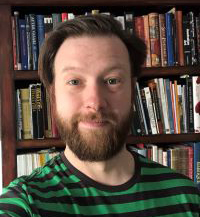
Dr Callum Reid
Associate of the School of Culture and Communication, The University of Melbourne
Callum Reid is an art historian whose research fields include museology, printmaking, early modern art and decorative arts, with a particular focus on the formation of collections and their reception. Callum is further interested in the history and provenance of objects, having also spent several years working in the art market and collecting institutions. Adapted from his PhD, his upcoming monograph Collecting and display in the Uffizi Gallery: Art in the age of the grand dukes (Routledge, 2021) is a museological study into Florence’s state gallery, and its early incarnations under the control of Medici and Lorraine grand duchies (1580-1859). Callum's research into 18th and 19th century museums aligns with the ERCC theme of Critique, Creativity, Comparison, as collectors and administrators toyed between the new trend of didactic arrangements and the self-representation of aesthetic displays.
Email: callum.reid@unimelb.edu.au

Dr Louise Box
School of Culture and Communication, the University of Melbourne
Louise is an art historian, curator, and educator with research interests in eighteenth-century visual and decorative arts; the collection and display of prints; the material culture of the English country house; and business and the arts. Her doctoral research focused on the print collection of Lady Elizabeth Seymour Percy, 1st Duchess of Northumberland (1716-1776). In 2018, Louise was the Harold Wright and Sarah and William Holmes Scholar in the Department of Prints and Drawings at the British Museum. She has also been awarded a Paul Mellon Research Support Grant and a Francis Haskell Memorial Fund Scholarship for research in collections and archives in the UK, Europe, and the USA. She is a Trustee of the Colin Holden Charitable Trust, which supports print scholarship. Louise’s publications include: 'Enlightened “Museums of Images” or Decorative Displays? Elizabeth Seymour Percy and the Eighteenth-Century Print Room' in Eighteenth-Century Life, Sept, 2021; a chapter in Kerrianne Stone (ed.) Horizon Lines, Marking 50 Years of Print Scholarship, Melbourne, 2019; and 'Marks and Meanings: Revealing the Hand of the Collector and “the Moment of Making” in two 18th-Century Print Albums', Journal18, Fall, 2018.
Email: box.l@unimelb.edu.au
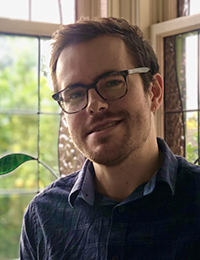
Dr Nat Cutter
Teaching Associate (Periodic) and ARC Research Coordinator, School of Historical and Philosophical Studies and School of Culture and Communication, The University of Melbourne
Nat’s current research focuses on the experiences and influence of British expatriates living in the Maghreb (Morocco, Algeria, Tunisia and Libya) in the seventeenth and eighteenth centuries, highlighting their broad networks of material, cultural, and informational exchange throughout the Mediterranean world and eastern Atlantic, and how their reports and attitudes were presented to a wide audience through British newspapers. He is interested broadly in interactions between Protestant Europe and the Islamic world, media history, diplomacy, networking, material culture, religious and cultural dialogue, privateering, and piracy. Nat has published articles on English news representations of the Maghreb, information flows between Britain and the Maghreb, and on social connection and isolation in British communities in the Maghreb. His research has been funded by the Huntington Library, the Folger Shakespeare Library, the American Society for Eighteenth-Century Studies, ANZAMEMS and the University of Melbourne. He is currently working on projects relating to the reception of the Maghreb in English, Scottish and Irish print, on the diffusion of Morocco leather in the British luxury bookbinding and upholstery trades, and on the importance of exilic theology as a framework for processing Protestant life in the Islamic Mediterranean.
Email: nat.cutter@unimelb.edu.au
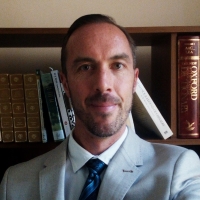
Dr Todd Dearing
Flinders University
Todd Dearing’s work focuses on Romantic ideas of the human and conceptions of imagination, creativity, and genius. He explores how these ideas impact upon contemporary literary criticism and contemporary ideas of the human. His doctoral thesis was on the trope of the daimon in William Blake’s magnum opus, Jerusalem: The Emanation of the Giant Albion, read as an allegory for literary practice. His broader research interests include English and German Romantic literature, art, and philosophy, (post)humanism, contemporary literary criticism, poetry, mythopoeia, and the links between psychology and literature. Todd is interested in the ERCC themes ‘Creativity, Critique, Comparison’ and ‘Actual, Mixed, and Virtual Realities’, and the ERCC research projects ‘Critique, Creativity, Innovation’, ‘William Blake and the History of Imagination’, and ‘Gothic Fictions’.
Email: todd.dearing@flinders.edu.au
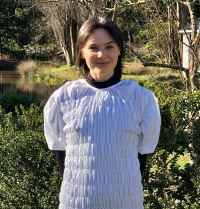
Sophie Dungan
Tutor, Monash University
Sophie Dungan is an educator whose research fields include vampire fiction, ecocriticism, Anthropocene studies and Gothic Fiction. Adapted from her MA, her first monograph, Reading the Vegetarian Vampire (Palgrave, forthcoming), traces the rise of the so-called ‘vegetarian’ vampire in popular culture, while also exploring how the shift in the diet of (some) vampires, from human to animal or synthetic blood, responds to a growing ecological awareness that is rapidly reshaping our understanding of relations with other species. Her broader research interests include critical race theory, ecofeminism and food studies. Sophie is interested in the ERCC themes of ‘The Human, the Nonhuman and the Inhuman’, ‘Liberty, Colonisation, Slavery’, and ‘The Anthropocene’.
Email: sophie.dungan@unimelb.edu.au
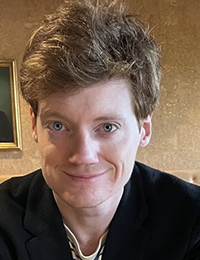
Dr Ryan Johnson
Research assistant and Tutor, Faculty of Arts and Social Sciences, University of Sydney
Ryan’s research interests include English, French and Japanese poetics, comparative views on modernity, literary theory, and the reception of classical Chinese texts in modern East Asia. Much of my work addresses the problems of theorizing the “world” in World Literature. His first book examined how, faced with increasing globalization, modern writers across the West and East Asia have navigated the difficulties of reconciling competing universalities, aesthetic, philosophical, and religious systems. His current projects consider how the concept of modernity has encouraged a transnational enthusiasm for comparative antiquities across America, Europe, and Asia, and how the dissemination and translation of radical Russian literature in Chinese, English, French, and Japanese have affected the very notion of an East-West divide in literature, philosophy, and spirituality.
Graduate researchers
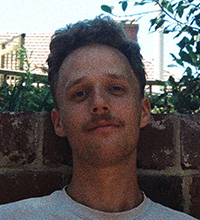
Joshua Barnes
PhD candidate in English and Theatre Studies, School of Culture and Communication, The University of Melbourne.
Joshua Barnes’ research investigates the relationship between generic forms and social forms in the literature of the long eighteenth century. Studying the mutually enabling relationship between epic, romance, the early English novel and other prose forms in the late seventeenth and early eighteenth centuries, his PhD project aims to describe the conditions of possibility of this heterogeneous literary field.

Alice Capstick
PhD Candidate and Teaching Associate, School of Languages, Literatures, Cultures and Linguistics, Monash University
Alice Capstick’s work focusses on the development of alternative heroic archetypes in the Romantic period. In particular, her work traces how the figure of the Satanic hero developed into a fully established archetype in the Romantic period. She examines how Romantic perception of Satan from John Milton’s Paradise Lost and other archetypal heroic figures informed their own experimentation with “dark heroes.” Alice is also interested in theories from the field of Literary Darwinism and how they can be used to understand and account for the enduring prevalence of certain types of dark heroes and people’s fascination with them. Her broader research interests include early modern poetry, aesthetic theory, gothic studies, and book history.
Alice was on the organising committee for 'Resilience, Renewal, Recovery', an international postgraduate conference co-hosted by the University of York's Centre for Eighteenth Century Studies (CECS) and the ERCC in 2021.
Email: Alice.Capstick@monash.edu
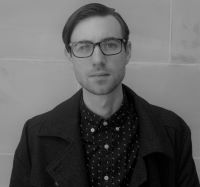
Corey Cribb
PhD candidate in Screen and Cultural Studies, School of Culture and Communication, The University of Melbourne
Corey Cribb specialises in film theory and the continental philosophy of film. Focusing on the film-philosophies of Gilles Deleuze and Jean-Luc Nancy, his research considers the potential of modern cinema to perpetuate the non-mediated transformation of the world and occasion the ontological renewal of thought, bodies and ways of being-in-the-world. In part, this involves a consideration of the palpable influence of Maurice Blanchot’s literary ontology upon these thinkers, and the subsequent question of why Deleuze and Nancy maintain that the marked passivity (or worklessness) of modern cinema harbours unprecedented potential for ontological change and the restoration of belief in a world from which we are said to be absent. Beyond the notion of worklessness as “the most essential – the most romantic and the most modern – gesture in romanticism” (Watt, 2017, pp. 18), Corey’s research connects with the concerns of the ERCC by seeking to show how some of the most ground breaking developments in film theory today bear the influence of debates which can be traced back to German Idealism.
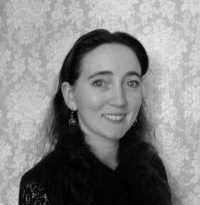
Marguerite Gibson
PhD Candidate in Art Theory and History, School of Media, Arts and Social Inquiry, Curtin University
Marguerite Gibson focuses on nineteenth century Australian colonial art, particularly in relation to the themes of aesthetics, landscape and the emotional traditions of the sublime. Currently, her research project is investigating the utilization of the sublime through motifs, nuances and Australian landscape depiction within art, representing the emotional experiences of the historical period of the Gold Rush era, 1850-1900. Through the primary texts of Edmund Burke and Immanuel Kant, along with the contemporary concept of the colonial sublime, she explores the relationship between these ideas, termed the Australian colonial sublime within the research. She currently has a book chapter forthcoming within Song of Death in Paradise: Death and Garden Narratives in Literature, Art and Film, edited by Feryal Cubukcu and Sabine Planka (Lexington Books), entitled “Wilderness Garden: Death, Landscape and the Australian Colonial Sublime”. Her research and interests relate to several ERCC themes, particularly Critique, Creativity, Comparison and Worldliness, Cosmopolitanism, Globalisation. Marguerite was on the organising committee for 'Resilience, Renewal, Recovery', an international postgraduate conference co-hosted by the University of York's Centre for Eighteenth Century Studies (CECS) and the ERCC in 2021.
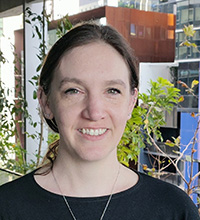
Samantha Happé
PhD Candidate and Graduate Research Teaching Fellow in Art History, School of Culture and Communication, University of Melbourne.
Samantha Happé specialises in the role of the gift in negotiating diplomatic relationships during the long eighteenth century. Her doctoral thesis examines the visual and material culture surrounding the Persian embassy to Versailles during the reign of Louis XIV in 1715, with a particular focus on the gifts as they travelled between cultural spheres that lacked a common symbolic vocabulary. Her research privileges the objects of exchange as being crucial and active tools of cross-cultural mediation, creating a new diplomatic history that considers the gifts as well as allowing for the performative aspects of the diplomatic encounter. Samantha is also working as a Research Officer at the Centre of Art History and Theory at ANU on a project mapping patterns of cultural exchange between France and non-European countries during the ancien régime, with an emphasis on Louis XIV prints and medals. Samantha’s research connects with several ERCC themes including Worldliness, Cosmopolitanism, Globalisation, and non-European Enlightenments and Romanticisms.
Email: s.happe@unimelb.edu.au
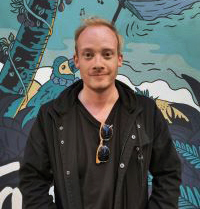
Rohan Harrison
PhD candidate in English and Theatre Studies, School of Culture and Communication, the University of Melbourne
Rohan specialises in literary genre theory and the gothic fictions of late-eighteenth and early-nineteenth-century Britain, considered as material practices involving a number of stakeholders in the changing print economy following the consumer revolution. His current research explores the role of the Minerva Press in the emergence of the gothic as a genre, considering its publishing output and marketing practices as attempts to cultivate a reliable readership by supplying readers with a particular sort of imaginary world. This use of genre serves as an important precursor to the marriage of marketing and textual immersion that would come to characterise the genre fictions of the twentieth and twenty-first centuries. Rohan’s focus on the romantic nostalgia of gothic worlds, put to work in the consumer economy through its ability to generate immersive virtual environments, connects his work to several ERCC themes, including Critique, Creativity, Comparison and Actual, Mixed and Virtual Realities.

Esmé James
PhD candidate in English and Theatre Studies, School of Culture and Communication, University of Melbourne
Esmé James’ work traces an aesthetic experience she has termed the ‘sexual sublime’ across a range of literature from the eighteenth to early twentieth century, investigating the social and ethical implications of the transforming relationship between erotism and the sublime aesthetic. She begins with the pornographic literary traditional of the eighteenth and nineteenth century, believing it particularly apt at engaging aesthetic discourse due to the latter’s palpable erotic undercurrent. Placing the works of theorists – such as Edmund Burke, David Hume, and Immanuel Kant – in conversation with novelists – such as John Cleland, Marquis de Sade, and Leopold von Sacher-Masoch – Esmé aims to demonstrate how these works illuminate and mutually complicate their ideas. Proceeding from here, she considers how the works of Rachilde and Kate Chopin subsequently disrupted dominant understandings of aesthetics and sexuality – instead, creating a space to express a space which exists within, and derives pleasure from, a zone of unconquerable excess.
Esmé currently has a journal article forthcoming in Hecate entitled, "Celebrating Enigmas: Re-Examining Gertrude Stein’s Relationship to the Literary Canon.” Her work will also be included in an anthology with Hardie Grant Press, Roots, set for publication in July 2021. Esme was on the organising committee for 'Resilience, Renewal, Recovery', an international postgraduate conference co-hosted by the University of York's Centre for Eighteenth Century Studies (CECS) and the ERCC in 2021.
Email: esmej@student.unimelb.edu.au
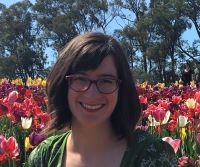
Francesca Kavanagh
PhD candidate in English and Theatre Studies, School of Culture and Communication, The University of Melbourne
Francesca Kavanagh specialises in eighteenth and nineteenth-century women’s reading and writing practices with a focus on material culture. She is also interested in the gothic and cultures of celebrity and fandom from Romanticism to the present. Her current project examines practices of letter-writing, annotation, and commonplacing from a range of women writers throughout the long eighteenth century and pairs this archival material with fictional accounts of these practices by Samuel Richardson and Jane Austen to elucidate the ways in which women in the long eighteenth-century used these textual practices in the production of textual and virtual spaces of intimacy. She currently has a journal article forthcoming in The Australasian Journal of Victorian Studies entitled “‘Marianne Knight | Godmersham Park’: Inscription as Community Interface in the Books of Jane Austen’s Niece”.
Francesca was on the organising committee for 'Distance 2020', an international postgraduate conference co-hosted by the University of York's Centre for Eighteenth Century Studies (CECS) and the ERCC. She is interested in a number of the ERCC’s current themes, including Actual Mixed and Virtual Realities and Worldliness, Cosmopolitanism, Globalisation, as well as opportunities for future collaborations.

Tarek Makhlouf
PhD candidate in Arabic, Asia Institute, The University of Melbourne
Tarek researches the content and context of traditions of philology with a particular emphasis on the Arabic tradition. Philology here is used in the traditional sense of studying texts and thus encompasses a broad array of activities including grammar, codicology, hermeneutics (in its broad meaning), literary criticism, and history. Tarek reads these philological works embedded in their socio-intellectual context, often revealing counter-intuitive results. His current project investigates the flow of Arabic philological learning from Islamic Spain to Egypt and the Levant in the 13th and 14th centuries. While maintaining his interest in the breadth of the ERCC’s themes and activities, Tarek is focused on two themes: ‘Non-European Enlightenments and Romanticisms’ and ‘Worldliness, Cosmopolitanism, Globalisation’. He is also currently working with ERCC researchers to put together a seminar series on Islamic Enlightenments.

Pierre Palayan
PhD Candidate in Art History, School of Culture and Communication, University of Melbourne.
Pierre Palayan’s research explores the role of porcelain in assessing the questions of what the Ottoman Empire meant to Western Europeans and how European powers represented Ottoman culture and politics during the eighteenth century. The research examines the political engagement between Europe and the Ottoman empire by focusing on the image of the Ottomans as portrayed by small-scale sculptures and other objects, and by considering the relationship between porcelain and the cultures associated with the aristocratic courts, turquerie and cosmopolitanism, and its significance within discourses having to do with geopolitics and nationalism.
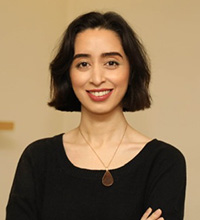
Mona Rahimpour
PhD candidate in English and Theatre Studies, School of Culture and Communication, The University of Melbourne
Mona Rahimpour’s research focuses on a trend in the contemporary global novel which engages with the accelerative precarity of human futures. What she identifies under the new conceptual cluster of Doom Lit projects imminent planetary threats into unsettlingly near futures, where human subjects struggle to adapt to acute ontological and existential disruption. She proposes to read these works in line with the relationality between their distinct aesthetic properties—what they are—and their affective qualities—what they do to the reader. Her methodology responds to Doom Lit as a site of attachment and material possibility as she considers doom in contemporary fiction to examine the relationship between the fictional depictions of the human ‘ends’ and the lived, material experiences of the present. Significantly, the plurality of ‘ends’ acknowledges diverse temporalities that prefigure human finality. This includes Indigenous knowledge (e.g. in Wright’s The Swan Book), refugee imaginaries (e.g. in Lanchester’s The Wall) and pandemic narratives (e.g. in McKay’s Animals in That Country). In so doing, she attends to nuances of heterogeneous imaginaries of the Global South with fundamental, and often subversive, ontological differences to what the end of the world may look like. Mona’s research connects with the concerns of ERCC in its focus on worldliness, cosmopolitanism and globalization and its involvement with the genealogy of aesthetic preoccupation with doom which she traces to the “Romantic climate”, exemplified in Byron’s Darkness and Mary Shelley’s figure of The Last Man.
Mona is an Erasmus Mundus alum and has a journal article forthcoming entitled “Intertextuality and Oneiric Futurity in Jean Rhys’ Wide Sargasso Sea”.

Belinda Scerri
PhD Candidate in Art History, School of Culture and Communication, The University of Melbourne
Belinda Scerri’s research explores French Rococo interior ornament, patronage and the ascendancy of ornémaniste artists in early eighteenth-century Paris. Her broader research interests include: the South Sea Bubble, Système Law and economic collapse of 1720 through an art historical lens; early modern collecting and commissioning cultures; mercantilism and the establishment of Royal manufactories; exoticism and cosmopolitanism in French Régence art and architecture. She is a founding member of the Centre of Visual Art (CoVA) doctoral academy and a 2019/2020 research fellow at the UCLA Center for Seventeenth and Eighteenth-Century Studies. She is currently writing a book chapter entitled ‘“Instructing herself by fad or fancy”: Depictions and Fictions of Female Connoisseurs in Eighteenth-century Paris’ which will appear in Portraits & Poses: Representations of Female Intellectual Authority, Agency and Authorship in Early Modern and Enlightenment Europe (Leuven and Cornell UP, 2020).
Email: bscerri@pgrad.unimelb.edu.au
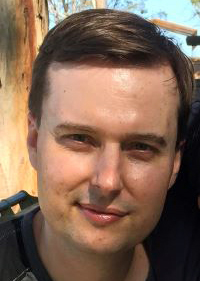
Dr Adrian Schober
MA candidate in the School of Culture and Communication, University of Melbourne
Adrian Schober’s research examines the role of Romanticism in the films of American director Steven Spielberg. He addresses this influence across a range of films, from the early to later part of Spielberg’s career, giving special attention to his studies of children and childhood. He positions the director as a late-Romantic to acknowledge how motifs and ideas within Romanticism continue to reassert themselves within contemporary culture. Adrian, who has a PhD in English from Monash University, is the author of Possessed Child Narratives in Literature and Film (Palgrave, 2004), and co-editor (with Debbie Olson) of Children in the Films of Steven Spielberg (Lexington, 2016) and Children, Youth, and American Television (Routledge, 2018). He is having a monograph published on The Omen for the Devil’s Advocates series by Auteur / Liverpool University Press. He is Senior Editor on the board of Red Feather: An International Journal of Children in Popular Culture.
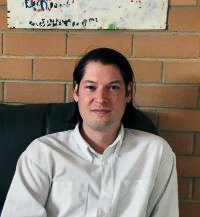
Hugh Sinclair
PhD Candidate in English and Theatre Studies, School of Culture and Communication, the University of Melbourne
Hugh Sinclair’s work focuses on Romantic poetry and the history of the scholarly edition. He is currently working on a comparative study of the editions of poets William Blake and Friedrich Hölderlin. This project looks at the changes brought about as digital media replace books as the repository of cultural memory, and the ways in which the advent of digital scholarly editions is recasting the role of the scholarly editor. By closely examining the inner workings of these editions, and by paying attention to the various technologies and editorial methodologies that underwrite them, this study reconstructs an editorial politics in relation to each poet that is ultimately a politics of cultural memory. An interest in the legacies of Romanticism in the present connects Hugh’s work to the concerns of the ERCC, particularly to themes of Critique, Creativity, Comparison and Actual, Mixed and Virtual Realities.

Samuel Watts
PhD candidate and Teaching Associate, School of Historical and Philosophical Studies, The University of Melbourne
Samuel Watts researches and writes about the experiences of African Americans in the Deep South during Reconstruction. His focus is on how formerly enslaved people interpreted ideas of freedom and citizenship in violently contested urban spaces, while working to construct and maintain lasting communities and networks. Additionally, Samuel is broadly interested in the historical legacies of racial discourse in the US, Australia and beyond. He currently has a book chapter in peer-review, entitled: “Reconstruction Justice: African American Police Officers in Charleston and New Orleans,” in Freedom’s Gained and Lost: Reinterpreting Reconstruction in the Atlantic World, eds. Simon Lewis and Adam Domby (New York: Fordham University Press, 2019 – forthcoming). He is interested in a number of ERCC projects, most notably those focused on slavery, and has an ongoing interest in the legacies of Enlightenment thought in debates about race, citizenship and revolution.
Staff
| Staff member | Position | Contact |
|---|---|---|
| Dr Anita Archer | Postdoctoral Research Fellow | Email: anita.archer@unimelb.edu.au Room: E278 |
Partners
Creativity and Wellbeing Hallmark Research Initiative (CAWRI), University of Melbourne
Modell Romantik Research Training Group, Friedrich-Schiller University Jena
Steering committee
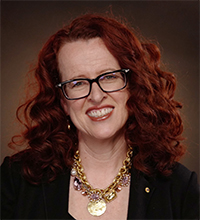
Distinguished Professor Genevieve Bell AO FTSE FAHA
Genevieve Bell is a renowned anthropologist, technologist, and futurist. Genevieve completed her PhD in cultural anthropology at Stanford University in 1998 and is best known for her work at the intersection of cultural practice and technology development. She is currently the Director of the School of Cybernetics and Florence Violet McKenzie Chair at the Australian National University and a Vice President and Senior Fellow at Intel Corporation.
Genevieve joined the ANU in 2017 after spending 18 years in Silicon Valley guiding Intel's product development and social science and user experience research capabilities. In 2017, Genevieve was appointed the inaugural Director of the 3A Institute, co-founded by the ANU and CSIRO's Data61. The Institute's mission is to establish a new branch of engineering to responsibly and sustainably scale AI-enabled cyber-physical systems. In 2021, she was appointed Director of the new School of Cybernetics at the ANU, which in addition to housing the 3A Institute, is focused on building capacity in Systems and Design.
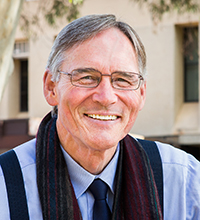
Emeritus Professor Will Christie
After teaching English literature at the University of Sydney for many years, Will Christie became Head of the ANU’s Humanities Research Centre (2015-2021) and Director of the Australasian Consortium of Humanities Researchers and Centres (2017-2022). He is currently co-ordinator of the Romanticism Section of the International Association of University Professors of English (IAUPE), on the International Advisory Board of the journal European Romantic Review, and general editor of the series China and the West in the Modern World for Sydney University Press. Will was founding President of the Romantic Studies Association of Australasia (RSAA) from 2010 to 2015 and has published widely in Romantic studies, including Samuel Taylor Coleridge: A Literary Life (2006), awarded the NSW Premier’s Biennial Prize for Literary Scholarship in 2008, The Letters of Francis Jeffrey to Thomas and Jane Welsh Carlyle (2008), The Edinburgh Review in the Literary Culture of Romantic Britain (2009), Dylan Thomas: A Literary Life (2014), and The Two Romanticisms, and Other Essays (2016). More recently, he was co-editor (with Jock Macleod and Peter Denney) of Politics and Emotions in Romantic Periodicals (2019) and (with Q.S. Tong and Angela Dunstan) of Tribute and Trade: China and Global Modernity, 1784-1935 (2020). Will was elected a Fellow of the Australian Academy of the Humanities in 2011.

Konfir Kabo
Konfir Kabo is the founding partner of Kabo Lawyers, a law firm based in Melbourne, Australia. He is also the CEO of Aksara Group, a service station investment trust.
Konfir has been an avid art collector for the past decade and is a passionate patron of the arts through Project 11, a philanthropic initiative he established with his wife. Project 11 works with key institutions such as the University of Melbourne, Monash University and RMIT University as well as arts organisations such as the National Gallery of Australia, Arts Centre Melbourne, Multicultural Arts Victoria, Melbourne Recital Centre and Musica Viva. Aside from the arts, Konfir also supports health initiatives such as autism research with OTARC, Australian Prostate Cancer Research and the Skin Cancer Foundation. He is currently on the board of Centre of Asian Business and Economics (The University of Melbourne), Australia Indonesia Art Forum and VCA Foundation.
Konfir has launched a few projects in Indonesia, including the establishment of an education centre in Bandung with Melbourne Polytechnic to deliver audio engineering courses as well as movie productions.
Konfir was born in Makassar, Indonesia in 1973. He studied Law and Commerce at Monash University. He was admitted as a solicitor and barrister of the Supreme Court of Victoria and the High Court of Australia in 1998. He is also a Fellow of the Australia and New Zealand College of Notaries. He currently resides in Melbourne with his wife and two children.
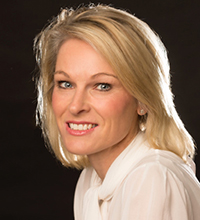
Seri Renkin OAM
An innovator and advocate for social and economic justice, Seri has over 25
years' experience working in the corporate, non-profit, philanthropic and
government sectors, including holding leadership, advisory and non-executive
board roles. Currently, Seri's work focuses on shifting the power in
philanthropy and impact investing, helping leaders in the social sector make
the critical shifts so their efforts can be more democratic, equitable and
effective.
Seri has led or contributed to the establishment of many social change
organisations in Australia and served on a wide range of Boards. She was
founding CEO and Managing Director of the ten20 Foundation, a 10 year impact
fund and founding Director of the Melbourne Office of Social Ventures
Australia (SVA), an organisation offering innovative solutions to society's
most pressing social problems. She was Chair of The Stella Prize, and a
Board Director of the International Women's Development Agency (IWDA) and
Australian's Investing in Women (AIIW). Seri is an Activator for the global
participatory fund SheEO. Prior to her roles in the social sector, Seri
was a Management Consultant working for Accenture in Australia and New
Zealand and Hay Management Consultants in London. She earned her BA (Hons)
from the University of Melbourne.
Seri is passionate about providing opportunities for young people, gender
lens approaches to social investment as well as walking alongside First
Nations people to reimagine an economic system that supports community
agency and sustainability.
in 2020 she was awarded an Order of Australia (OAM) in recognition of her
services to communities and non-profit organisations.
Publications
2021
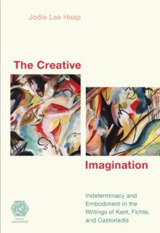
Heap, Jodie Lee. The Creative Imagination: Indeterminacy and Embodiment in the Writings of Kant, Fichte and Castoriadis. Rowman, 2021.
By engaging with the notions of indeterminacy and embodiment within the writings of Immanuel Kant, Johann Fichte and Cornelius Castoriadis, this book addresses and brings to the fore the significance of the creative imagination as an ontological source of human creation. Principally inspired by Castoriadis’ revolutionary elucidation of the imagination and the imaginary, this book actively contributes to this neglected line of enquiry by exposing deep lines of continuity and rupture both within and between the writings of Kant, Fichte, and Castoriadis. More information…
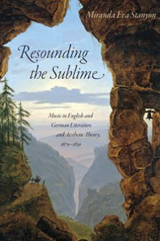
Stanyon, Miranda Eva. Resounding the Sublime: Music in English and German Literature and Aesthetic Theory, 1670-1850. University of Pennsylvania Press, 2021.
What does the sublime sound like? Harmonious, discordant, noisy, rustling, silent? Miranda Eva Stanyon rereads and resounds this crucial aesthetic category in English and German literatures of the long eighteenth century from a musical perspective and shows how sonorous sublimes lay at the heart of a central and transformative discourse. For Enlightenment and Romantic era listeners, the musical sublime represented a sonic encounter of the most extreme kind, one that tested what humans were capable of feeling, imagining, thinking, and therefore becoming. More information…
2020
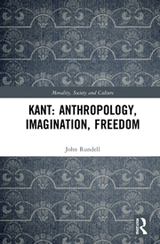
Rundell, John. Kant: Anthropology, Imagination, Freedom. Routledge, 2020.
In a new reading of Immanuel Kant’s work, this book interrogates his notions of the imagination and anthropology, identifying these – rather than the problem of reason – as the two central pivoting orientations of his work. Such an approach allows a more complex understanding of his critical-philosophical program to emerge, which includes his accounts of reason, politics and freedom as well as subjectivity and intersubjectivity, or sociabilities. Examining Kant’s theorisation of the complexity of our phenomenological existence, the author explores his transcendental move that includes reason and understanding whilst emphasising the importance of the faculty of the imagination to undergird both, before moving to consider Kant’s pluralised, transcendental notion of freedom. This outstanding book will appeal to scholars with interests in philosophy, politics, anthropology and sociology, working on questions of imagination, reason, subjectivities and human freedom.
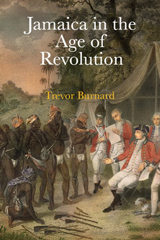
Burnard, Trevor. Jamaica in the Age of Revolution. University of Pennsylvania Press, 2020.
Between the start of the Seven Years’ War in 1756 and the onset of the French Revolution in 1789, Jamaica was the richest and most important colony in British America. White Jamaican slaveowners presided over a highly productive economic system, a precursor to the modern factory in its management of labor, its harvesting of resources, and its scale of capital investment and output. Planters, supported by a dynamic merchant class in Kingston, created a plantation system in which short-term profit maximisation was the main aim. Their slave system worked because the planters who ran it were extremely powerful.
In Jamaica in the Age of Revolution, Trevor Burnard analyses the men and women who gained so much from the labor of enslaved people in Jamaica to expose the ways in which power was wielded in a period when the powerful were unconstrained by custom, law, or, for the most part, public approbation or disapproval. Burnard finds that the unremitting war by the powerful against the poor and powerless, evident in the day-to-day struggles slaves had with masters, is a crucial context for grasping what enslaved people had to endure.
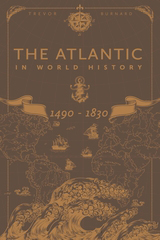
Burnard, Trevor. The Atlantic in World History, 1490-1830. Bloomsbury, 2020.
The Atlantic in World History, 1490-1830 looks at the historical connections between four continents – Africa, Europe, North America and South America – through the lens of Atlantic history. It shows how the Atlantic has been more than just an ocean: it has been an important site of circulation and transmission, allowing exchanges and interchanges which have profoundly shaped the development of the world.
Divided into four thematic sections, Trevor Burnard’s sweeping yet concise narrative covers the period from the voyages of Columbus to the New World in the 1490s through to the end of the Age of Revolutions around 1830. It deals with key topics including the Columbian exchange, Atlantic slavery and abolition, war as a global phenomenon, the Age of Revolution, religious conversion, nation-building, trade and commerce and intellectual movements such as the Enlightenment. Rather than focusing on the ‘rise of the West’, Burnard stresses the interactive nature of encounters between various parts of the world, setting local case studies within his broader interconnected narrative.
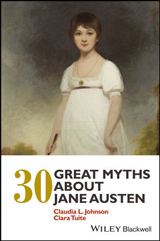
Johnson, Claudia L. and Tuite, Clara. 30 Great Myths about Jane Austen. John Wiley & Sons, 2020.
Was Jane Austen the best-selling novelist of her time? Are all her novels romances? Did they depict the traditional world of the aristocracy? Is Austen’s writing easy to understand? Well into the 21st century, Jane Austen continues to be one of the most compelling novelists in all English literature. Many of her ideas about class, family, history, intimacy, manners, love, desire, and society, have inspired “myths” that are often contradictory – she was a Tory who was also a liberal feminist, or, her novels are at once sharply satirical and unapologetically romantic. Myths, like Austen’s works, are dynamic, changing over time and impacting how we read and interpret literature. 30 Great Myths about Jane Austen examines the accepted beliefs – both true and untrue – that have most influenced our readings of Austen. Rather than simply de-bunking, or validating, commonly-held views about Austen, authors Claudia L. Johnson and Clara Tuite explore how these myths can be used to engage with the life, work, and reception of Jane Austen.
2019
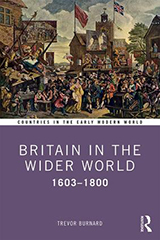
Burnard, Trevor. Britain in the Wider World, 1603-1800. Routledge, 2019.
Britain in the Wider World traces the remarkable transformation of Britain between 1603 and 1800 as it developed into a world power. At the accession of James VI and I to the throne of England in 1603, the kingdoms of England / Wales, Scotland and Ireland were united only by having a monarch in common. They had little presence in the world and were fraught with violence. Two centuries later, the consolidated state of the United Kingdom, established in 1801, was an economic powerhouse and increasingly geopolitically important, with an empire that stretched from the Americas, to Asia and to the Pacific. The book offers a fresh approach to assessing Britain’s evolution, situating Britain within both imperial and Atlantic history, and examining how Britain came together politically and socially throughout the eighteenth century.
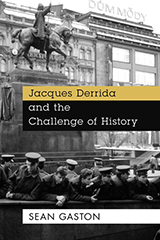
Gaston, Sean. Jacques Derrida and the Challenge of History. Rowman and Littlefield, 2019.
This important new book argues that Jacques Derrida’s work can be treated as the basis for a distinctive historiography. The possibility of seeing Derrida not as a philosopher of language but as a philosopher of history has become more apparent with the recent publication of Derrida’s 1964-1965 seminar Heidegger: The Question of Being and History. We now know that the problem of history was at the heart of Derrida’s writing in the mid-1960s, prior to the publication of his best-known work, Of Grammatology (1967).
Arguing that Derrida’s scholarship in the 1960s and early 1970s on historicism, historicity and the problem of history can be treated as the basis for a philosophy of history, Sean Gaston focuses on Derrida’s work from the mid-1970s to the mid-1990s and his relentless questioning of context, memory and narrative as the delineation of a deconstructive historiography.
2018
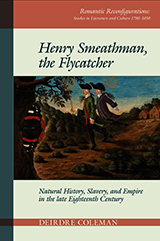
Coleman, Deirdre. Henry Smeathman, the Flycatcher: Natural History, Slavery, and Empire in the Late Eighteenth Century. Liverpool University Press, 2018.
In 1771 Joseph Banks and other wealthy collectors sent a talented, self-taught naturalist to Sierra Leone to collect all things rare and curious, from moths to monkeys. Henry Smeathman’s expedition to the West African coast, which coincided with a steep rise in British slave trading in this area, lasted four years during which time he built a house on the Banana Islands, married into the coast’s ruling dynasties, and managed to negotiate the tricky life of a ‘stranger’ bound to his landlord and local customs. In this book, which draws on a rich and little-known archive of journals and letters, Coleman retraces Smeathman’s life as he shuttled between his home on the Bananas and two key Liverpool trading forts – Bunce Island and the Isles de Los.
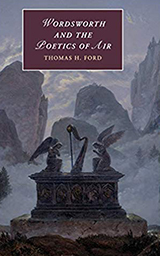
Ford, Thomas H. Wordsworth and the Poetics of Air. Cambridge University Press, 2018.
Before the ideas we now define as Romanticism took hold the word ‘atmosphere’ meant only the physical stuff of air; afterwards, it could mean almost anything, from a historical mood or spirit to the character or style of an artwork. Thomas H. Ford traces this shift of meaning, which he sees as first occurring in the poetry of William Wordsworth. Gradually ‘air’ and ‘atmosphere’ took on the new status of metaphor as Wordsworth and other poets re-imagined poetry as a textual area of aerial communication – conveying the breath of a transitory moment to other times and places via the printed page. Reading Romantic poetry through this ecological and ecocritical lens Ford goes on to ask what the poems of the Romantic period mean for us in a new age of climate change, when the relationship between physical climates and cultural, political and literary atmospheres is once again being transformed.
2020
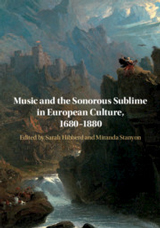
Hibberd, Sarah and Stanyon, Miranda (eds.). Music and the Sonorous Sublime in European Culture, 1680-1880. University of Cambridge Press, 2020.
The sublime - that elusive encounter with overwhelming height, power or limits – has been associated with music from the early-modern rise of interest in the Longinian sublime to its saturation of European culture in the later nineteenth century and beyond. This volume offers a historically situated study of the relationship between music, sound and the sublime. Together, the authors distinguish between the different aesthetics of production, representation and effect, while understanding these as often mutually reinforcing approaches. They demonstrate music’s strength in playing out the sublime as transfer, transport and transmission of power, allied to the persistent theme of destruction, deaths and endings. The volume opens up two avenues for further research suggested by the adjective ‘sonorous’: a wider spectrum of sounds heard as sublime, and (especially for those outside musicology) a more multifaceted idea of music as a cultural practice that shares boundaries with other sounding phenomena.
2019
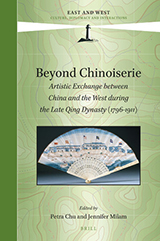
Chu, Petra and Milam, Jennifer (eds.,). Beyond Chinoiserie: Artistic Exchange Between China and the West During the Late Qing Dynasty (1796-1911). East and West series, Vol. 4. Brill, 2019.
The complex interweaving of different Western visions of China had a profound impact on artistic exchange between China and the West during the nineteenth century. Beyond Chinoiserie addresses the complexity of this exchange. While the playful Western “vision of Cathay” formed in the previous century continued to thrive, a more realistic vision of China was increasingly formed through travel accounts, paintings, watercolours, prints, book illustrations, and photographs.
Simultaneously, the new discipline of sinology led to a deepening of the understanding of Chinese cultural history. Leading and emerging scholars in the fields of art history, literary studies and material culture, have authored the ten essays in this book, which deal with artistic relations between China and the West at a time when Western powers’ attempts to extend a sphere of influence in China led to increasingly hostile political interactions.
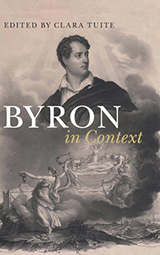
Tuite, Clara (ed.,). Byron in Context. Cambridge University Press, 2019.
George Gordon, the sixth Lord Byron (1788-1824), was one of the most celebrated poets of the Romantic period, as well as a peer, politician and global celebrity, famed not only for his verse, but for his controversial lifestyle and involvement in the Greek War of Independence. In thirty-seven concise, accessible essays, by leading international scholars, this volume explores the social and intertextual relationships that informed Byron’s writing; the geopolitical contexts in which he travelled, lived and worked; the cultural and philosophical movements that influenced changing outlooks on religion, science, modern society and sexuality; the dramatic landscape of war, conflict and upheaval that shaped Napoleonic and post-Napoleonic Europe and Regency Britain; and the diverse cultures of reception that mark the ongoing Byron phenomenon as a living ecology in the twenty-first century. This volume illuminates how we might think of Byron in context, but also as a context in his own right.
2018
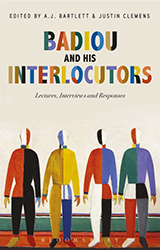
Clemens, Justin and Bartlett, A. (eds.,). Badiou and His Interlocutors. Bloomsbury Academic, 2018.
This is a unique collection presenting work by Alain Badiou and commentaries on his philosophical theories. It includes three lectures by Badiou, on contemporary politics, the infinite, cinema and theatre and two extensive interviews with Badiou – one concerning the state of the contemporary situation and one wide ranging interview on all facets of his work and engagements. It also includes six interventions on aspects of Badiou’s work by established scholars in the field, addressing his concept of history, Lacan, Cinema, poetry, and feminism; and four original essays by young and established scholars in Australia and New Zealand addressing the key concerns of Badiou’s 2015 visit to the Antipodal region and the work he presented there.
With new material by Badiou previously unpublished in English this volume is a valuable overview of his recent thinking. Critical responses by distinguished and gifted Badiou scholars writing outside of the European context make this text essential reading for anyone interested in the development and contemporary reception of Badiou’s thought.
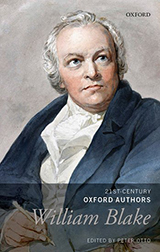
Otto, Peter (ed.,). William Blake: Selected Works. Oxford University Press, 2018.
This volume in the 21st Century Oxford Authors series offers students and readers a comprehensive selection of the work of William Blake (1757-1827). Accompanied by full scholarly apparatus, this authoritative edition enables students to explore Blake’s poetry, illuminated poetry, and prose alongside selections from his letters, manuscripts, notebook, advertising pamphlets, marginalia, and works he printed in conventional letterpress.
The edition arranges Blake’s works in chronological order, according to the date when they were first printed or, in the case of unpublished works, the years in which they were composed. With the help of editorial headnotes and annotations, this arrangement brings to the foreground Blake’s material and intellectual labours as a poet, painter, prophet, and non-academic philosopher; the networks of acquaintances, friends, patrons, and enemies who helped support or provoke this work; and the tumultuous historical events he responded to, which included the beginning of modern feminism, the agricultural and industrial revolutions, the American and French Revolutions, William Pitt’s so-called ‘Reign of Terror’ in Britain, an attempted revolution in Ireland (1798), a successful slave rebellion in Haiti (1791-1804), and the French revolutionary and Napoleonic wars. Some editions attempt to sanitise Blake, by hiding from view the most startling elements of his thought; but in this edition Blake’s sexual, political, religious, and poetic heterodoxy comes into full view.
2020
- Clemens, Justin and Bartlett, A. J. “Minus Something Indefinable,” in Badiou, Alain. The Pornographic Age. Bloomsbury, 2020
- Ford, Thomas H. and Hughes, Joe. “Rhetoric,” in The Oxford Research Encyclopaedia of Literature. Oxford University Press, 2020
- Knowles, Claire. “‘Far from my native fields removed’: Gentility, Displacement, and the Idea of Home in the Life and Poetry of Charlotte Smith,” in Labbe, Jacqueline and Dolan, Elizabeth A. (eds.,). Placing Charlotte Smith. Lehigh University Press, 2020
- McLean, Ian. “Indigenising the Australian Artworld: National Culture and State Sovereignty,” in Bennett, Tony; Stevenson, Deborah; Myers, Fred and Winikoff, Tamara (eds.,). The Australian Art Field: Practices, Policies, Institutions. Routledge, 2020
- Otto, Peter. “Light, moonlight, darkness and the world,” in Maidment, Simon (ed.,). NGV Triennial 2020. National Gallery of Victoria, 2020
- Otto, Peter. ““Second birth” and Gothic fictions in Matthew Lewis’s The Monk, Catherine Blake’s “Agnes”, and William Blake’s Vala or The Four Zoas,” in Rajan, Tilottama and Faflak, Joel (eds.,). William Blake: Modernity and Disaster. Toronto University Press, 2020
2019
- Clemens, Justin. “Agamben and Poetry,” in Ghosh, Ranjan (ed.,). Philosophy and Poetry: Continental Perspectives. Columbia University Press, 2019
- Clemens, Justin and Bartlett, A.J. “Happiness is Revolting,” in Badiou, Alain. Happiness (trans. A. J. Bartlett, Justin Clemens). Bloomsbury Academic, 2019
- Clemens, Justin. “Irremediability: On the Very Concept of Digital Ontology,” in Amanda, Lagerkvist (ed.,). Digital Existence: Ontology, Ethics and Transcendence in Digital Culture. Taylor & Francis, 2019
- Clemens, Justin. “The Question Concerning Technology: Badiou versus Heidegger,” in Völker, Jan (ed.,). Badiou and the German Tradition of Philosophy. Bloomsbury Academic, 2019
- Davis, Mark. “Unsettled Objects: Books, Cultural Politics, and the Case of Reading the Country,” in Morrissey, Philip and Healy, Chris (eds.,). Reading the Country: 30 Years On. University of Technology Sydney EPress, 2019
- Ford, Thomas H. “Orlando’s Romantic Climate Change,” in Collett, Anne and Murphy, Olivia (eds.,). Romantic Climates: Literature and Science in an Age of Catastrophe. Palgrave Macmillan, 2019
- Ford, Thomas H. “Natural Philosophy,” in Tuite, Clara (ed.,). Byron in Context. Cambridge University Press, 2019
- Ford, Thomas H. “Max Frisch’s Man in the Holocene: Geological Cli-Fi,” in Goodbody, Axel and Johns-Putra, Adeline (eds.,). Cli-Fi: A Companion. Peter Lang, 2019
- Ford, Thomas H. “George Turner’s Sea and Summer (1987): Urban Dystopian Cli-Fi,” in Goodbody, Axel and Johns-Putra, Adeline (eds.,). Cli-Fi: A Companion. Peter Lang, 2019
- Ford, Thomas H. “Adorno: Poetry After Poetry,” in Ghosh, Rangan (ed.,). Philosophy and Poetry: Continental Perspectives. Columbia University Press, 2019
- Greig, Elias. “Wordsworth in the Tropics of Cumbria,” in Collett, Anne and Murphy, Olivia (eds.,). Romantic Climates: Literature and Science in an Age of Catastrophe. Palgrave Macmillan, 2019
- Hampton, Steven. “Utopia or Dystopia? The Romantics in Switzerland, 1816,” in Collett, Anne and Murphy, Olivia (eds.,). Romantic Climates: Literature and Science in an Age of Catastrophe. Palgrave Macmillan, 2019
- Mierowsky, Marc and Aarons, Debra. “Obscenity, Dirtiness and Licence in Jewish Comedy,” in Wilkie, Ian (ed.,). The Routledge Comedy Studies Reader. Routledge, 2019
- Milam, Jennifer. “Greuze Girls and the Painterly Embodiment of Sexual Pleasure,” in Dixon, L. and Weisberg, G.P. (eds.,). Making Waves: Crosscurrents in the Study of 19th-Century Art. Brepols Publishers, 2019
- Milam, Jennifer. “Representations of Peace,” in Armitage, D. and Ghervaism, S. (eds.,). A Cultural History of Peace in the Age of Enlightenment (1648-1815). London: Bloomsbury Academic, 2019
- Otto, Peter. “‘Rouse Up O Young Men of the New Age!’: Ōe Kenzaburō and William Blake on Bodies, Biopolitics, and the Imagination,” in Watson, Alex and Williams, Laurence (eds.,). British Romanticism in Asia: The Reception, Translation, and Transformation of Romantic Literature in India and East Asia. Palgrave Macmillan, 2019
- Otto, Peter. “The Ends of Illustration: Explanation, Critique, and the Political Imagination in Blake’s Title-pages for Genesis,” in Haywood, Ian; Matthews, Susan and Shannon, Mary (eds.,). Romanticism and Illustration. Cambridge University Press, 2019
- Otto, Peter. “William Blake, the Secularization of Religious Categories, and the History of Imagination,” in King, Joshua and Werner, Winter (eds.,). Constructing Nineteenth-Century Religion: Literary, Historical, and Religious Studies in Dialogue. Ohio State University Press, 2019
- Otto, Peter. “William Blake, the Ancient Gnostics, and the Birth of Modern Gnosticism,” in Trompf, Garry; Mikkelsen, Gunner and Johnston, Jay (eds.,). The Gnostic World. Routledge, 2019
- Tuite, Clara. “‘Literatoor’ and Literary Theory”, in Tuite, Clara (ed.,). Byron in Context. Cambridge University Press, 2019
- Tuite, Clara. “When the Earth Moves,” in Collett, Anne and Murphy, Olivia (eds.,). Romantic Climates: Literature and Science in an Age of Catastrophe. Palgrave Macmillan, 2019
2018
- Clemens, Justin. “Drug is the Love: Literature, Psychopharmacology, Psychoanalysis,” in Goldbach, J. and Godley, J.A. (eds.,). Inheritance in Psychoanalysis. State University of New York Press, 2018
- Clemens, Justin. “If Law Speaks, It Speaks of Enjoyment: Psychoanalysis and Desire,” in Zartaloudis, Thomas (ed.,). Law and Philosophical Theory: Critical Intersections. Rowman & Littlefield International, 2018
- Clemens, Justin and Bartlett, A. “Introduction: The World Turned Upside Down,” in Clemens, J. and Bartlett, A. (eds.,). Badiou and His Interlocutors. Bloomsbury Academic, 2018
- Clemens, Justin. “The Last Horizon the Gaze Obscures,” in Haylock, B. (ed.,). Continuous Moment: Damiano Bertoli. Surpllus, 2018
- Clemens, Justin. “The Paradox of Dissemination,” in Blamey, D. and Haylock, B. (eds.,). Distributed. Open Editions, 2018
- Clemens, Justin. “‘Their Jarring Spheres Confound’: John Milton’s Paradise Lost as a Counter-Baroque War Machine,” in Ndalianis, Angela and Beaven, Lisa (eds.,). Emotion and the Seduction of the Senses, Baroque to Neo-Baroque. Medieval Institute Publications, 2018
- Hadiz, Vedi R. “Islamic Populism and the Politics of Neoliberal Inequalities,” in Routledge Handbook of Global Populism. Routledge, 2018
- Hadiz, Vedi R. “Islamic Populism in Indonesia: Emergence and Limitations,” in Hefner, Robert W. (ed.,). Routledge Handbook of Contemporary Indonesia. Routledge, 2018
- Otto, Peter. “The Horrors of Creation: Globes, Englobing Powers, and Blake’s Archaeologies of the Present,” in Bundock, Chris and Effinger, Elizabeth (eds.,). William Blake’s Gothic Imagination: Bodies of Horror. Manchester University Press, 2018
- Stanyon, Miranda. “‘A Possession for Eternity’: Thomas De Quincey’s Feeling for War,” in Downes, Stephanie; Lynch, Andrew and O’Loughlin, Katrina (eds.,). Writing War in Britain and France, 1370-1854: A History of Emotions. Routledge, 2018
- Wawrzinek, Jennifer, “Postcolonial Dandies and the Death of the Flâneur,” in Bystrom, Kerry; Harris, Ashleigh and Webber, Andrew J. (eds.,). South and North: Contemporary Urban Orientations. Routledge India, 2018
2020
- Aarons, Debra and Mierowsky, Marc (2020). “The Marvelous Mrs. Maisel as an Alternative History of Stand-Up,” in Comedy Studies
- Archer, Anita (2020). “Materialising Markets: The Agency of Auctions in Emergent Art Genres in the Global South,” in Arts 9, No. 4, pp. 106-106
- Bekmen, Ahmet; Ongel, Ferit Serkan and Hadiz, Vedi R. (2020). “Contesting Working-Class Politics in Turkey: Social Transformations, Islam, and the Left,” in Critical Sociology 46, No. 7-8, pp. 1025-1040
- Clemens, Justin (2020). “Not Not. A Note on the Figures of Power in Giorgio Agamben,” in Etica e Politica / Ethics and Politics 22, No. 3
- Clemens, Justin (2020). “Morbus Anglicus; or, Pandemic, Panic, Pandaemonium,” in Crisis and Critique 7, No. 3
- Clemens, Justin (2020). “Where then shall hope and fear –, ” in Meanjin
- Clemens, Justin (2020). “An Alogical Space of Genetic Reintrication: Notes on an Element of Giorgio Agamben’s Method,” in Polemos
- Clemens, Justin (2020). “In the State of Nature Nothing will be Lost,” in Australian Humanities Review 66
- Davis, Mark (2020). “The Culture Wars and Corporatism: The Cultural Mission in Australian Non-Fiction Book Publishing, 1958-2018,” in Australian Literary Studies 35, No. 1
- Davis, Mark (2020). “The Online Anti-Public Sphere,” in European Journal of Cultural Studies
- Green, Charles, and Gardner, Anthony (2020). “Okwui Enwezor’s Johannesburg Biennale: Curating in Times of Crisis,” in Documenta Studies 8
- Hadiz, Vedi R (2020). “Indonesia’s Missing Left and the Islamisation of Dissent,” in Third World Quarterly
- Knowles, Claire (2020). “Female Romantic Poetry, 1798-1819: The Climate of Fear and the Loss of a Radical Generation,” in Women’s Writing pp. 1-14
- McHugh, Siobhan, McLean, Ian and Neale, Margo (2020). “Notes from a Cross-Cultural Frontier: Investigating Australian Aboriginal Art through Podcasts,” in Liminalities: A Journal of Performance Studies 16, No. 4
- Otto, Peter (2020). ““Looking ‘thro ... & not with” the Eye: From Romanticism to the Counter Culture, Rock and Roll, and the Anthropocene,” in European Romantic Review 31, pp. 67-74
- Otto, Peter (2020). “Negotiating the ‘Holy Land’: Cross-Cultural Encounters from Bonaparte to Blake.” Postcolonial Studies 23, No. 3, pp. 404-429
- Rundell, John (2020). “Underdevelopment and Critical Theorizing: Empowerment and Cosmopolitan Democracy,” in Critical Horizons 21, No. 4, pp. 367-377
- Rundell, John (2020). “Kant on the Imagination: Fanciful and Unruly, or ‘an Indispensable Dimension of the Human Soul’,” in Critical Horizons 21, No. 2, pp. 106-129
- Stanyon, Miranda (2020). “Organ Pipes and Bodies with Organs: Listening to De Quincey’s First Opium War Essays,” in Literature & History 29, No. 1, pp. 19-36
- Tuite, Clara (2020). “Speechless: Werther-Fever and the Media of Romantic Love,” in Cultural and Social History 17, No. 3, pp. 333-353
- Weber, Millicent, and Davis, Mark (2020). “Feminism in the Troll Space: Clementine Ford’s Fight Like a Girl, Social Media, and the Networked Book,” in Feminist Media Studies 20, No. 7, pp. 944-965
2019
- Burnard, Trevor. “A New Look at the Zong Case of 1783,” in XVII-XVIII 76, 2019
- Burnard, Trevor. “Beyond Salutary Neglect: A Reflection on ‘Thinking the Empire Whole’,” in History Australia 16 No. 4, 2019, pp. 642-645
- Champion, Matthew S. and Stanyon, Miranda. “Musicalising History,” in Transactions of the Royal Historical Society 29 No. 4, 2019, pp. 79-103
- Clemens, Justin. “First Fruits of a Barron Field,” in Critical Quarterly 61 No. 1, 2019, pp. 18-36
- Coleman, Deirdre. “Anti-Slavery, African Colonization, and the Natural History of Ballooning,” in Romanticism 25 No. 1, 2019, pp. 32-44
- Davis, Mark. “A new, online culture war? The communication world of Breitbart.com,” in Communication Research and Practice 5 No. 3, 2019, pp. 241-254
- De Wildt, Lars, Apperley, Thomas H., Clemens, Justin, Fordyce, Robbie and Mukherjee, Souvik. “(Re-)Orienting the Video Game Avatar,” in Games and Culture, 2019
- Diprose, R., McRae, Dave and Hadiz, Vedi R. “Two Decades of Reformasi in Indonesia: Its Illiberal Turn,” in Journal of Contemporary Asia 49 No. 5, 2019, pp. 691-712
- Ford, Thomas H. and Clemens, Justin. “Barron Field’s Terra Nullius Operation,” in Australian Humanities Review 65, 2019, pp. 1-19
- Ford, Thomas H. “Frankenscription, a natural history of poetry,” in Nineteenth-Century Contexts 41 No. 3, 2019, pp. 271-285
- Hadiz, Vedi R. “The ‘Floating’ Ummah in the Fall of ‘Ahok’ in Indonesia,” inTRaNS: Trans -Regional and -National Studies of Southeast Asia 7 No. 2, 2019, pp. 271-290
- Hankinson,Alexandra. “Flora’s Go-betweens: Nectar, Insects, and Flowers in the Romantic Natural History of Pollination,” in Romanticism 25 No. 1, 2019, pp. 3-21
- Jiang, James. “Curious Self-Evidence: Graphology and Gusto in Marianne Moore’s Critical Prose,” in Modernism/modernity 26 No. 2, 2019, pp. 375-398
- Mierowsky, Marc. “John West. Dryden and Enthusiasm: Literature, Religion, and Politics in Restoration England,” in The Review of English Studies 70 No. 294, 2019, pp. 368-370
- Rundell, John. “David Roberts: Images of Aesthetic Modernity,” in Thesis Eleven 152 No. 1, 2019, pp. 76-86
- Rundell, John. “Joel S. Kahn (1947-2017) – Perennial Anthropologist,” in Thesis Eleven 151 No. 1, 2019, pp. 117-124
- Stanyon, Miranda. “The Passion of Edmund Burke: ‘To Dr H_____n’ Revisited,” in Huntington Library Quarterly 82 No. 2, 2019, pp. 249-276
- Tuite, Clara. “Redeemed from the Worm: Manfred’s Celebrity Revenge Tragedy,” in Romantic Circles Praxis, June 2019, pp. 1-17
- Weber, M. and Davis, Mark. “Feminism in the Troll Space: Clementine Ford’s Fight Like a Girl, Social Media, and the Networked Book,” in Feminist Media Studies, 2019
2018
- Archer, Anita. “Genesis of an Auction Sale Category: Sotheby’s Inaugural Auction of ‘Contemporary Chinese Art’,” in Journal for Art Market Studies 2 No. 3, 2018
- Burnard, Trevor. “A Voice for Slaves: The Office of the Fiscal in Berbice and the Beginning of Protection in the British Empire, 1819-1834,” in Pacific Historical Review 87 No. 1, 2018, pp. 30-53
- Burnard, Trevor and Candlin, Kit. “Sir John Gladstone and the Debate over the Amelioration of Slavery in the British West Indies in the 1820s,” in Journal of British Studies 57 No. 4, 2018, pp. 760-782
- Clemens, Justin. “Barron Field and the Myth of Terra Nullius,” in Journal and Proceedings of the Royal Society of New South Wales 151 No. 2, 2018, pp. 135-141
- Clemens, Justin. “Of Avatars and Apotheoses: David Fallon’s Blake,” in Filozofski Vestnik 39 No. 2, 2018, pp. 41-57
- Clemens, Justin. “As Fire Burns: Philosophy, Slavery, Technology,” in Crisis and Critique 5 No. 1, 2018, pp. 130-145
- Coleman, Deirdre. “Antislavery Satire before Abolitionism: Two New Images,” in The Wordsworth Circle 49 No. 1, 2018, pp. 28-32
- Davis, Mark. “‘Globalist war against humanity shifts into high gear’: Online anti-vaccination websites and ‘anti-public’ discourse,” in Public Understanding of Science 28 No. 3, 2018
- Davis, Mark. “‘Culture is inseparable from race’: Culture Wars from Pat Buchanan to Milo Yiannopoulos,” in M/C Journal 21 No. 5, 2018
- Ford, Thomas H. “Echohistoricism: Aristotle, Dryden, Montgomery, Conrad,” in Romanticism 24 No. 3, 2018, pp. 278-293
- Ford, Thomas H. “Miracles 24/7,” in Art + Australia 55.1, 2018, pp. 44-51
- Ford, Thomas H. “The Romanthropocene,” in Literature Compass 15 No. 5, 2018
- Hadiz, Vedi R. “Imagine All the People? Mobilising Islamic Populism for Right-Wing Politics in Indonesia,” in Journal of Contemporary Asia 48 No. 4, 2018
- Inglis, A., Coleman, Deirdre and Gaston, Vivian. “British and Australian portraits at the National Gallery of Victoria,” in Art Journal of the National Gallery of Victoria No. 56, 2018
- Knowles, Claire. “A Woman’s Place is in the Morgue: Understanding Scully in the Context of 1990s Feminism,” in M/C Journal 21 No. 5, 2018
- Knowles, Claire. “Della Cruscanism and Newspaper Poetics: Reading the Letters of Simkin and Simon in the World,” in Studies in Romanticism 57 No. 4, 2018, pp. 581-600
- Tuite, Clara. “Lord Byron’s Preposterous Liberalism: Perversity, or The Fear that Pleases,” in Occasion 11, 2018
- Tuite, Clara. “Jane Austen’s House of Friction,” in Persuasions: The Jane Austen Journal On-Line 38 No. 2, 2018
- Van Ryn, Luke, Apperley, Thomas and Clemens, Justin. “Avatar Economies: Affective Investment from Game to Platform,” in New Review of Hypermedia and Multimedia 24 No. 4, 2018, pp. 291-306
General contact
Email: ER-CC@unimelb.edu.au
Director contact
Email: peterjo@unimelb.edu.au
Phone: +61 3 8344 5482
Address
Enlightenment, Romanticism and Contemporary Culture (ERCC) Research Unit
School of Culture and Communication, Faculty of Arts
Room E278, Level 2, John Medley (Building 191)
The University of Melbourne, Victoria 3010 Australia
Mailing list
Subscribe to our mailing list and stay up to date with ERCC news, events and activities.
Follow ERCC on Twitter
Follow us on Twitter @ERCCUnimelb
Please note: Subscribers to the ERCC will receive a newsletter with news and events, and be the first to know of our upcoming activities and new resources. The University of Melbourne Privacy Policy (MPF1104) applies to any information collected.
Location